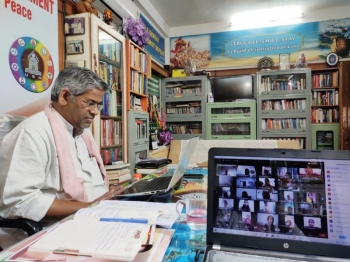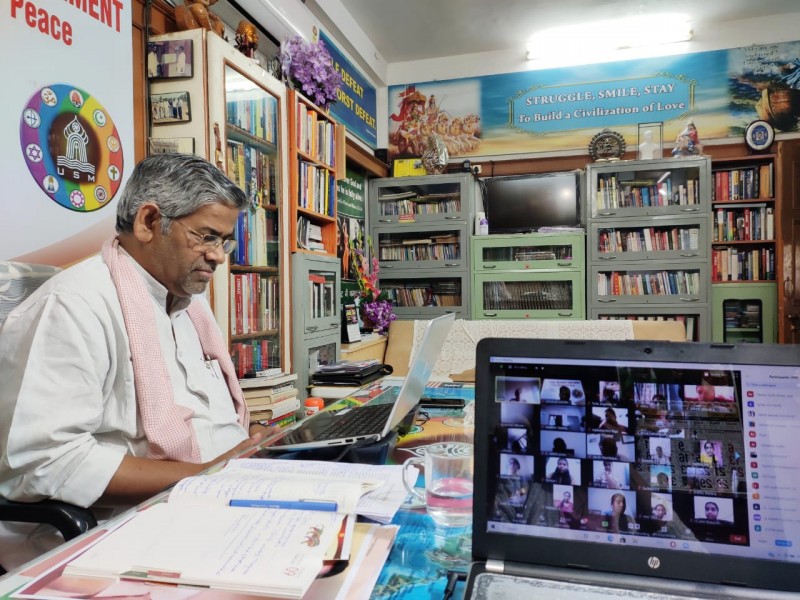
.png) Jacob Peenikaparambil
Jacob Peenikaparambil

India has been witnessing increasing conflicts among the followers of different religions and castes for the last few years. Political parties and religious leaders often indulge in mudslinging and character assassination against each other. Indian society is becoming more and more violent in thought, speech and action. Mowing down four farmers by a speeding vehicle at Lakhimpur Kheri in UP and chopping off hands and legs of a man in Haryana allegedly by Nihang Sikhs are only two latest examples of horrible and most inhuman actions. It appears that human beings have no value. The young generation, especially students, are very much influenced and affected by the hateful, revengeful and violent atmosphere in society.
Against this backdrop, positive changes that have taken place in a group of students who participated in one week leadership training at Universal Solidarity Movement (USM) Indore gives the hope that change can be brought about in society through the youth. At the end of the leadership training held from October 10 to 16, 2021 twenty six students from St. Xavier’s School Khadipur, Sultanpur, UP, presented their personal reports, summarizing their main observations, learning, the changes that have taken place in them and the resolutions they have taken to sustain the changes.
The testimony of Saumya Kumar, a class IX student, highlights the gist of the remarkable changes that have taken place in the participants of the training. “I learnt many things from USM, but the most important thing I learnt is “HUMANITY”. I also learnt the importance of time management and to become self-reliant”, wrote Saumya Kumar in his personal report.
“I have seen many changes in me. Earlier I never realized my mistakes, but I do now. I used to get angry at small things, but I am controlling myself now. I wasn’t a peacemaker, but now I do believe in it. I used to throw anything anywhere, but I am not doing it now”, acknowledged Anshika Pandey in her report.
“USM taught me to wash my plates and clothes and I will continue to do them. It also taught me to be self disciplined and to follow the spirit of Vasudhaiva Kutumbakam”, wrote Nishant Pratap Singh.
“I learned the difference between spirituality and religiosity. Spirituality is practicing the moral and ethical values taught by religions and religiosity is the practice of rituals, prayers and devotions” wrote Raj Krishna. The same idea was expressed by Yogita Bhargav in different words: “Religion is not mere rituals, but it is responsibility and duty; relinquishing discrimination is religion; unity and harmony is religion; humanity is religion”.
The personal reports written and presented by 26 students on the last day of their training, indeed, reflected the transformation that has taken place in them. Five prominent changes mentioned in most of the personal reports are 1) understanding religion as spirituality of practising moral and ethical values and respecting all religions 2) readiness to see God in every human being and honour all human beings irrespective of their status, religion, caste and profession and 3) decision to become a visionary person rather than an ambitious person and to leave a legacy by following an inclusive approach 4) realizing the importance of self discipline and self education and 5) increase in self confidence, especially, overcoming stage fear.
Almost all students wrote in their report that they could overcome their stage fear and enhance their self confidence to come to the stage and speak to an audience. For example, Anshika Pandey wrote in her report, “before coming to USM there was a lot of stage fear within me. The first day I was able to speak only three lines and my hands and legs were shivering. Now the fear inside me is gone and I am able to speak in front of all”.
In view of sustaining the changes the students experienced in them, they have made some resolutions. A few examples of the resolutions made by the students are the following.
 “I will practice the Five Paths of self transformation promoted by USM; I will not postpone my work, but I will do it immediately. I will never adopt shortcuts in my life”- Soumya Kumar.
 “I will respect all religions and follow the path of pluralism. I will become a human being with humanity”- Nishant Pratap Singh.
 “I will be my own brand and stand apart from the crowd; I will be the best version of myself”- Akanksha Bind.
 “I will use my mobile phone only for a short period. I will read the newspaper daily and I will make my own opinion on various issues. Before going to bed I will make a self evaluation of what I did during the day” Ayush Yadav.
 “I will always follow the path of non-violence and motivate others to follow the same”- Yogita Bhargav.
 “I will be a visionary and spiritual person”-Himadri Singh.
 “I will control my problem of short-temperedness. Before performing any religious ritual I will try to know the meaning of it first”- Nimisha Yadav.
Students have expressed their appreciation of the dynamics and the methodology of the training. They acknowledged that they used to see movies for entertainment, but in USM they learned to “read” movies and the five movies (Pratighat, Dharam, Do Kalakar, Gandhi and Prahar) shown to them were a great source of learning. Yogita Bhargave has summarized her learning from the movies as follows.
• We have to become spiritual persons rather than religious persons.
• We should have within us a big dream, energy, enthusiasm and determination to become effective leaders.
• The enemies within the nation are more harmful than the enemies from outside.
• Women are not to be worshipped, but their dignity is to be respected and they should have equality.
After watching the movie, ‘Gandhi’ many students confessed that they were prejudiced against Gandhi and they had wrong ideas about him. They blindly believed what others said without reading anything about Gandhiji. As a result of watching the movie and discussing the life and mission of Gandhiji, almost all students promised that they would not make judgment on anyone without knowing about the person concerned from authentic sources.
Students also have mentioned in their reports that they learned from the atmosphere of the USM and the USM community as much as they learned from various sessions. They have written that they could see in practice in the USM community what they heard in the classes.
• “I learned from the USM community to respect and honour everyone irrespective of the work he or she does. The atmosphere of USM is so inspiring that after coming here I had no desire for anything else other than learning. This place is full of motivational quotes which inspire me every second”-Yogita Bhargav.
• “USM team members are very cooperative, caring, and understanding and treat everyone as their child”. Nimisha Yadav.
• “USM environment is very good. Here all live like a family and attention is paid to everyone's feelings”- Saumya Kumar.
• The most important thing I learned from the USM community is punctuality- Akanksha Bind.
The positive changes that have taken place in the students as a result of leadership training are very significant in the backdrop of the current socio political context of India. Fundamentalism is not only growing in all religions in India, but also it is overpowering the spiritual dimension of religions. Extraordinary rise in superstitious practices and blind faith, escalating hate speech against other religions, cutthroat competition in building worship centres and erecting statues, organizing ostentatious religious gatherings and increasing intolerance towards other religions are the signs of fundamentalism devouring religions. Because of politicization, religions are becoming poisonous and the most dangerous divisive force in India.
It is easier to bring about change in the youth than in adults and grown up people, and value based education is the best and the most effective means for transforming the youth. The ultimate goal of education should be forming good human beings. Otherwise society may have to pay a heavy price. Let the political and religious leaders and all educators listen to what Dr. Haim Ginott, child psychologist and educationist, who was a survivor of Nazi concentration camp, has to say.
“I am a survivor of a concentration camp. My eyes saw what no person should witness. Gas chambers built by the learned engineers. Children poisoned by educated physicians. Infants killed by trained nurses. Women and babies shot by high school and college graduates. So I am suspicious of education. “My request is: Help your children become human. Your efforts must never produce learned monsters or skilled psychopaths. Reading, writing and arithmetic are important only if they serve to make our children more human”.